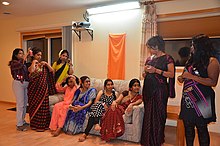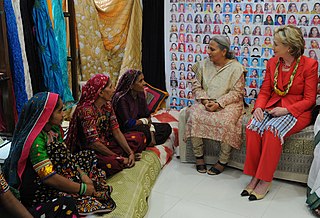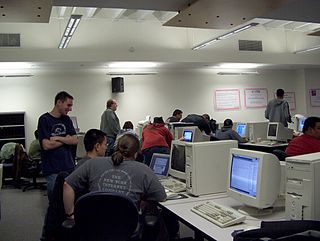
In India, a kitty party is a social event held as part of an informal savings club. It is a kind of party usually organized by women, and commonly held in the afternoon on a monthly basis. [1]

In India, a kitty party is a social event held as part of an informal savings club. It is a kind of party usually organized by women, and commonly held in the afternoon on a monthly basis. [1]
Kitty parties began in India during the early 1950s, in the aftermath of the 1947 partition. [2] [3] Initially, the informal savings events were hosted at home by middle-class women in northern Indian states, such as Punjab or Uttar Pradesh, whose families were struggling to recover financially from the turmoil caused by partition. [2] Alongside the financial aspect, kitty parties also created a valuable social outlet for women, many of whom were not culturally permitted to work or travel much outside the home. [3] [4]
By the 1980s, the growth of consumerism in Indian society meant that kitty parties had evolved and were also becoming popular with wealthier women, who used it as a way to save for more expensive household items. [2] Kitty parties continue to be popular in India today, and can be found in other South Asian countries and in parts of the world where Indian diaspora communities have formed, such as Singapore, the United Kingdom, and the United States. [2] [3] [5] While the events are still primarily organized by groups of women, some modern variations have included couples and family kitty parties, which allow partners and children to participate, [2] and the emergence of men's kitty parties. [6]
Kitty refers to the amount collected at the party, every member contributing a certain sum of money each month. The kitty is handed over to one member of the group every month. [1] Chit funds operate along similar principles, and the chit-fund association of India has estimated there are thousands of Indian companies that include management of kitty party funds as part of their services, although these companies tend to be interested only in higher value kitty party funds. [7]
It is usually held at a specified time each month, by a specific group of women. Every member of the group has to host a party at least once. The hosting member organizes food and other logistics. [8] In most of India and Pakistan, it is usually simply referred to as a 'committee'.
At meetings, members may share personal stories, business tips, family recipes, or general "skills and hacks." [3] Entertainment can include guest speakers, cooking demonstrations, themed costume parties, parlour games, tarot card readings, and more. [2]

A party is a gathering of people who have been invited by a host for the purposes of socializing, conversation, recreation, or as part of a festival or other commemoration or celebration of a special occasion. A party will often feature food and beverages, and often conversation, music, dancing, or other forms of entertainment.

Microfinance consists of financial services targeting individuals and small businesses who lack access to conventional banking and related services. Microfinance includes microcredit, the provision of small loans to poor clients; savings and checking accounts; microinsurance; and payment systems, among other services. Microfinance services are designed to reach excluded customers, usually poorer population segments, possibly socially marginalized, or geographically more isolated, and to help them become self-sufficient. ID Ghana is an example of a microfinance institution.

Rahul Rajiv Gandhi is an Indian politician. A member of the Indian National Congress (INC), he is currently serving as the 12th Leader of the Opposition in Lok Sabha and as the member of the Lok Sabha for Rae Bareli, Uttar Pradesh, since June 2024. He previously represented the constituency of Wayanad, Kerala, from 2019 to 2024, and Amethi, Uttar Pradesh, from 2004 to 2019. Gandhi served as the party president of the Indian National Congress from December 2017 to July 2019 and is the chairperson of the Indian Youth Congress, the National Students Union of India, and a trustee of the Rajiv Gandhi Foundation and Rajiv Gandhi Charitable Trust. He is a member of the Nehru–Gandhi political family.

A baby shower is a party centered on gift-giving to celebrate the delivery or expected birth of a child. It is a rite of passage that celebrates through giving gifts and spending time together.

Self-Employed Women's Association (SEWA), meaning "service" in several Indian languages, is a trade union based in Ahmedabad, India, that promotes the rights of low-income, independently employed female workers. Nearly 2 million workers are members of the Self-Employed Women’s Association across eight states in India. Self-employed women are defined as those who do not have a fixed employer-employee relationship and do not receive a fixed salary and social protection like that of formally-employed workers and therefore have a more precarious income and life. SEWA organises around the goal of full employment in which a woman secures work, income, food, and social security like health care, child care, insurance, pension and shelter. The principles behind accomplishing these goals are struggle and development, meaning negotiating with stakeholders and providing services, respectively.
A chit fund is a type of rotating savings and credit association system practiced in India, Bangladesh, Sri Lanka, Pakistan and other Asian countries. Chit fund schemes may be organized by financial institutions, or informally among friends, relatives, or neighbours. In some variations of chit funds, the savings are for a specific purpose. Chit funds are often microfinance organizations.
Indian School Muscat is an Indian school in the Darsait area of Muscat, Oman.

The BAPS Shri Swaminarayan Mandir of Chicago, Illinois is a traditional Hindu place of worship built by the BAPS Swaminarayan Sanstha. The BAPS Swaminarayan Sanstha, which is headed by Mahant Swami Maharaj, is a denomination of the Swaminarayan Sampradaya within Hinduism. The mandir is located in the Chicago suburb of Bartlett and opened on August 7, 2004. It was built of hand-carved Italian marble and Turkish limestone. The mandir is the largest of its kind in Illinois and was constructed in accordance to the Shilpa shastras. The mandir complex spreads over 27 acres and includes the mandir and the haveli.

Village banking is a microcredit and saving methodology whereby financial services are administered locally in a community bank rather than in a centralized commercial bank. Village banking has its roots in ancient cultures and was most recently adopted for use by micro-finance institutions (MFIs) as a way to control costs. Early village banking methods were innovated by Grameen Bank and then later developed by groups such as FINCA International founder John Hatch. Among US-based non-profit agencies there are at least 31 microfinance institutions (MFIs) that have collectively created over 800 village banking programs in at least 90 countries. And in many of these countries there are host-country MFIs—sometimes dozens—that are village banking practitioners as well. The latest developments globally can be seen in Southeast Asia, where digitization is pacing fast to reach rural areas with hybrid on- and offline solutions.
A rotating savings and credit association (ROSCA) is a group of individuals who agree to meet for a defined period in order to save and borrow together, a form of combined peer-to-peer banking and peer-to-peer lending. Members all chip in regularly and take turns withdrawing accumulated sums.

A self-help group is a financial intermediary committee usually composed of 12 to 25 local women between the ages of 18 and 50. Most self-help groups are in India, though they can be found in other countries, especially in South Asia and Southeast Asia. A SHG is generally a group of people who work on daily wages who form a loose grouping or union. Money is collected from those who are able to donate and given to members in need.

A Linux User Group or Linux Users' Group (LUG) or GNU/Linux User Group (GLUG) is a private, generally non-profit or not-for-profit organization that provides support and/or education for Linux users, particularly for inexperienced users. The term commonly refers to local groups that meet in person but is also used to refer to online support groups that may have members spread over a very wide area and that do not organize, or are not dependent on, physical meetings. Many LUGs encompass FreeBSD and other free-software / open source Unix-based operating systems.

A computer security conference is a convention for individuals involved in computer security. They generally serve as meeting places for system and network administrators, hackers, and computer security experts. Common activities at hacker conventions may include:
The Working Women's Forum (WWF) is a women's organisation in southern India. It was founded in 1978 by Jaya Arunachalam in Madras (Chennai). The WWF aims to empower poor women in southern India by providing microcredit, a trade union, health care and training. It works with the poor women working in the informal sector, such as street vendors, silkworm growers and silk weavers, handicraft producers, washerwomen and fisherwomen.

Saarang is the annual social and cultural festival of IIT Madras. It is a 5-day long festival usually in the second week of the year. Founded in 1974, Saarang is the second oldest college festival in India. It was started in the name of 'Mardi Gras' with a small number of quizzes and music events. It adopted the name 'Saarang' and grew with the help of corporate sponsorship, collaboration with large-scale event organizers and international artists.
Renana Jhabvala is an Indian social worker based in Ahmedabad, India, who has been active for decades in organising women into organisations and trade unions in India, and has been extensively involved in policy issues relating to poor women and the informal economy. She is best known for her long association with the Self-Employed Women's Association (SEWA), India, and for her writings on issues of women in the informal economy.
Women's football in India is growing in popularity under All India Football Federation, despite the earlier long-term governing body's inability to provide sufficient funds for the game.

The Saradha Group financial scandal was a major political scandal caused by the collapse of a Ponzi scheme run by Saradha Group, a consortium of over 200 private companies that was believed to be running collective investment schemes popularly but incorrectly referred to as chit funds in Eastern India.
A chama is an informal cooperative society that is normally used to pool and invest savings by people in East Africa, and particularly Kenya. The chama phenomenon is also referred to as "micro-savings groups". "Chama" is the Kiswahili word for "group" or "body". The chama phenomenon arose out of the idea of harambee, which means "all together", in the late 1980s and 1990s. Originally, chamas tended to be exclusively women's groups, but as chamas started to grow in sophistication and success, men started participating in chamas as well. The chama structure is used throughout Africa, but is particularly popular in Kenya where the word originated. In Kenya there are estimated to be 300,000 chamas managing a total of KSH 300 billion in assets. Chamas are known for their exclusivity. In order to join, new members are typically subjected to extensive interviews and must have assurances or guarantees made for them by an existing member. Some sources have estimated that one in three Kenyans is a chama member.

Legislative Assembly elections were held in Goa on 14 February 2022 to elect 40 members of the Eighth Goa Legislative Assembly. The votes were counted and the results were declared on 10 March 2022.